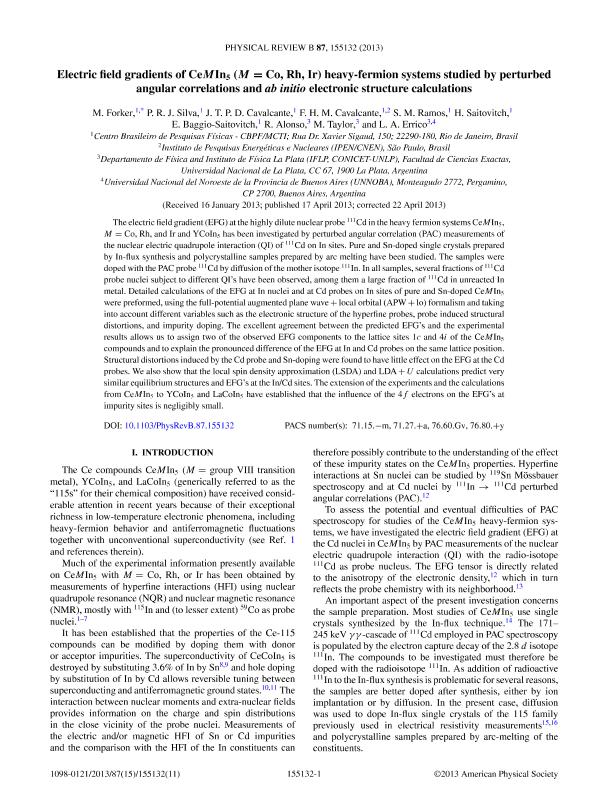Artículo
Electric field gradients of CeMIn5 (M = Co, Rh, Ir) heavy-fermion systems studied by perturbed angular correlations and ab initio electronic structure calculations
Forker, M.; Silva, P. R. J.; Cavalcante, J. T. P. D.; Cavalcante, F. H. M.; Ramos, S. M.; Saitovitch, H.; Baggio Saitovitch, E.; Alonso, Roberto Emilio ; Taylor, Marcela Andrea
; Taylor, Marcela Andrea ; Errico, Leonardo Antonio
; Errico, Leonardo Antonio
 ; Taylor, Marcela Andrea
; Taylor, Marcela Andrea ; Errico, Leonardo Antonio
; Errico, Leonardo Antonio
Fecha de publicación:
04/2013
Editorial:
American Physical Society
Revista:
Physical Review B: Condensed Matter and Materials Physics
ISSN:
1098-0121
Idioma:
Inglés
Tipo de recurso:
Artículo publicado
Clasificación temática:
Resumen
The electric field gradient (EFG) at the highly dilute nuclear probe 111Cd in the heavy fermion systems CeMIn5, M = Co, Rh, and Ir and YCoIn5 has been investigated by perturbed angular correlation (PAC) measurements of the nuclear electric quadrupole interaction (QI) of 111Cd on In sites. Pure and Sn-doped single crystals prepared by In-flux synthesis and polycrystalline samples prepared by arc melting have been studied. The samples were doped with the PAC probe 111Cd by diffusion of the mother isotope 111In. In all samples, several fractions of 111Cd probe nuclei subject to different QI's have been observed, among them a large fraction of 111Cd in unreacted In metal. Detailed calculations of the EFG at In nuclei and at Cd probes on In sites of pure and Sn-doped CeMIn5 were preformed, using the full-potential augmented plane wave+local orbital (APW+lo) formalism and taking into account different variables such as the electronic structure of the hyperfine probes, probe induced structural distortions, and impurity doping. The excellent agreement between the predicted EFG's and the experimental results allows us to assign two of the observed EFG components to the lattice sites 1c and 4i of the CeMIn5 compounds and to explain the pronounced difference of the EFG at In and Cd probes on the same lattice position. Structural distortions induced by the Cd probe and Sn-doping were found to have little effect on the EFG at the Cd probes. We also show that the local spin density approximation (LSDA) and LDA+U calculations predict very similar equilibrium structures and EFG's at the In/Cd sites. The extension of the experiments and the calculations from CeMIn5 to YCoIn5 and LaCoIn5 have established that the influence of the 4f electrons on the EFG's at impurity sites is negligibly small.
Palabras clave:
Ab-Initio
,
Heavy Fermions
,
Electric Field Gradient
Archivos asociados
Licencia
Identificadores
Colecciones
Articulos(IFLP)
Articulos de INST.DE FISICA LA PLATA
Articulos de INST.DE FISICA LA PLATA
Citación
Forker, M.; Silva, P. R. J.; Cavalcante, J. T. P. D.; Cavalcante, F. H. M.; Ramos, S. M.; et al.; Electric field gradients of CeMIn5 (M = Co, Rh, Ir) heavy-fermion systems studied by perturbed angular correlations and ab initio electronic structure calculations; American Physical Society; Physical Review B: Condensed Matter and Materials Physics; 87; 15; 4-2013; 1151321-11513211
Compartir
Altmétricas



